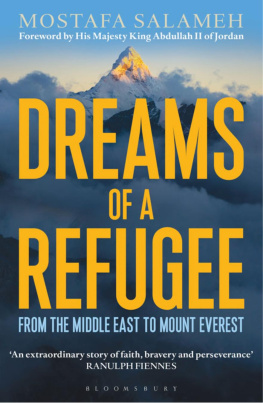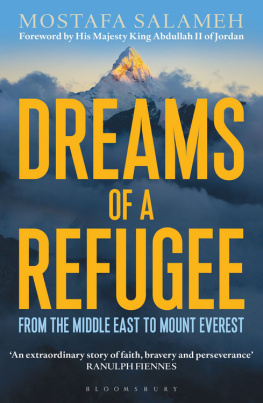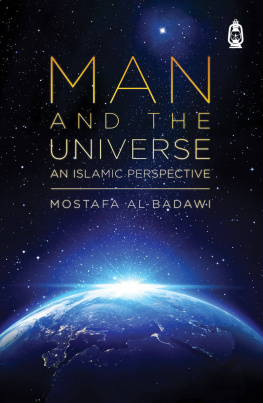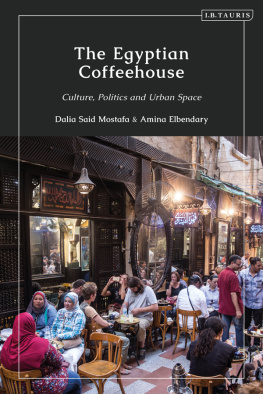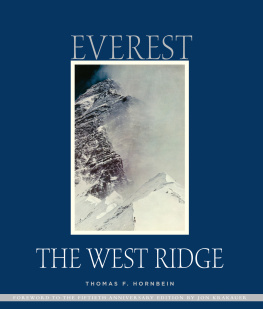
DREAMS OF A REFUGEE
For my parents
DREAMS OF A REFUGEE
From the Middle East to
Mount Everest
MOSTAFA SALAMEH
Edited by Robert Mullan

Allah will not change the condition of a people until they change what is in themselves.
Quran, 13:11
If you can talk with crowds and keep your virtue,
Or walk with Kings nor lose the common touch;
If neither foes nor loving friends can hurt you;
If all men count with you, but none too much;
If you can fill the unforgiving minute
With sixty seconds worth of distance run,
Yours is the Earth and everything thats in it,
And which is more youll be a Man, my son!
Rudyard Kipling
It has been my great pleasure to become acquainted with the Jordanian mountaineer, author and activist Mostafa Salameh over the past twelve years. Some time ago, Mostafa shared with me his dream to climb Mount Everest for the benefit of Jordan and as a role model for Arab youth. In completing this challenge he would become the first Jordanian to conquer Everest, before going on to scale the Seven Summits and reach both Poles. I was delighted when on May 25th 2008, Jordans Independence Day, Mostafa called me early in the morning to convey the splendid news that he had summited Mount Everest. He has since accomplished the rest of his objectives the Explorers Grand Slam and with this book has added to those achievements once more.
With his deep understanding for the challenges that refugees face and dedication to his work with young people across the Middle East and the World encouraging them to pursue their dreams, Mostafa is a truly remarkable individual. I feel strongly that Mostafa Salamehs story should be read for its larger message on the determination necessary to face real challenges and make a change for the better.
His Majesty King Abdullah II ibn Al Hussein
The Hashemite Kingdom of Jordan
September 2016
I am proud of my Muslim beliefs and I am proud of my Jordanian identity, and I am proud of the Palestinian blood that runs in my veins, and I am proud of being British.
MOSTAFA SALAMEH
Sometime in November 2017, on the hundredth anniversary of the Balfour Declaration, Ill be taking a group of about twenty people, from various countries of the Arab World, to the peak of Ben Nevis. On this legendary Scottish mountain Ill unfurl the Palestinian flag and also that of the BDS movement, a Palestinian civil society-led group calling for boycotts, divestment and sanctions against Israel until it complies with international law. In doing so I will try and raise awareness of the injustices continuously meted out to Palestinians both in their homeland and in the many refugee camps scattered among its neighbouring countries.
My companions will be Palestinians from around the world, including the USA, Europe and the Occupied West Bank. Among them will be academics, artists and journalists all people who can communicate to the world what has been achieved and why the climb took place. I found many of these enthusiastic Palestinians through Facebook, others through my informal networks, and some through my great friend Mary Nazzal-Batayneh, a barrister and activist for palestinian rights. The climb will be sponsored and we will raise money for numerous Palestinian causes.
I climb mountains for a cause, not just for the thrill and sense of adventure.
Ben Nevis (Gaelic: Beinn Nibheis) is indisputably the highest mountain in Britain. Beinn is the most common Gaelic word for mountain, while Nibheis is usually translated as malicious or venomous. An alternative interpretation is that Beinn Nibheis derives from beinn namh-bhathais, from namh (heavens, clouds) and bathais (top of a mans head); in other words, the mountain with its head in the clouds or, indeed, the mountain of Heaven.
At 1,344 metres (4,409 feet) above sea level, its found at the western end of the Grampian Mountains, close to the small but well-known town of Fort William. Its a popular destination, attracting well over 100,000 ascents a year, most of whose climbers use the Pony Track from Glen Nevis. The 700-metre (2,300 feet) cliffs of the north face are among the highest in the UK, and provide classic scrambles and rock climbs of all levels of difficulty for mountaineers. The summit is the collapsed dome of an ancient volcano, and features the ruins of an observatory, which was in continuous use between 1883 and 1904. The data collected during this period are still important for understanding Scottish mountain weather and, indeed, Charles Wilson invented his cloud chamber after a period spent working there.
The first path to the peak was built at the same time as the observatory and designed to allow ponies to carry up supplies, with a maximum gradient of one in five. The path made the ascent popular, all the more so after the arrival in 1894 of Fort Williams West Highland Railway.
The first recorded ascent of Ben Nevis was made on 17 August 1771 by Edinburgh botanist James Robertson, who was in the region collecting specimens. John Keats reached the peak in 1818, and compared the ascent to mounting ten St Pauls without the convenience of a staircase. It was not until 1847 that the Ordnance Survey confirmed Ben Nevis as the highest mountain in Britain and Ireland, ahead of its rival Ben Macdhui.
When I proudly stand on Ben Nevis, I will say, This is the hundredth anniversary of the Balfour Declaration, and as I stand here on the top of Britain, I ask the British Government what are you doing to solve the tragedy that your ancestors created?
Very few documents in political history have had as much influence as the Balfour Declaration, a 67-word statement contained within a short letter from the British Foreign Secretary, Lord Arthur Balfour, on 2 November 1917. This short declaration acknowledged the establishment of a Jewish home in Palestine.
His Majestys Government view with favour the establishment in Palestine of a national home for the Jewish people, and will use their best endeavours to facilitate the achievement of this object, it being clearly understood that nothing shall be done which may prejudice the civil and religious rights of existing non-Jewish communities in Palestine, or the rights and political status enjoyed by Jews in any other country.
The letter was addressed to Lionel Walter Rothschild, a British banker and Zionist activist, who drafted the declaration with the help of fellow Zionists Chaim Weizmann and Nahum Sokolow. The declaration proved to be in line with the wishes of Zionist leaders who hoped for a homeland in Palestine and the right for Jews from the world over to relocate there. Balfour was part of David Lloyd Georges liberal government, which believed that Jews had undergone injustice for too long and that the West was to blame. Therefore, he reasoned, it was their responsibility to locate and establish a Jewish homeland.
The motivation for achieving this was aided by fundamentalist Christians who encouraged the depopulation of Jews from their own lands, and also wished to fulfil what they argued was the biblical prophecy, in which the return of Christ will occur after the establishment of a Jewish kingdom in the Holy Land.
The Declaration was highly controversial, primarily because of the nature of its highly ambiguous and, perhaps, contradictory text. One interpretation was that what was being argued for was not the idea of establishing a unique Jewish state, but rather a geographical homeland where Jews would live alongside Palestinians and other Arabs. Also, it was pointed out that they could take the second part of the Declaration, concerning the protection of the rights of Palestinian Arabs, as the British endorsing Arab autonomy. Britain indeed protected Arab rights at some points during the mandate, but its role remained contradictory.
Next page
